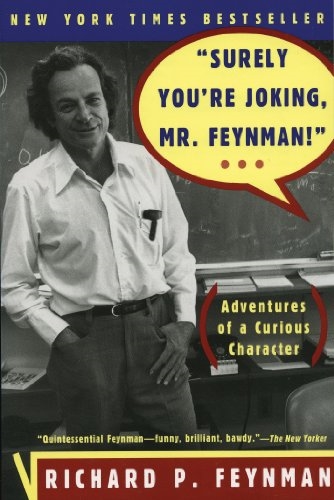Surely You’re Joking, Mr. Feynman is the first book of a two-book series, the other being “What Do You Care What Other People Think?”: Further Adventures of a Curious Character. Both are edited and in the case of the audiobook, narrated by Ralph Leighton.
As is the case with a lot of my serious reading, I actually listened to this as an audiobook. This has the upside of allowing me to listen as I mow, work in the yard or clean the house. It has the downside of having no printed or ebook version, so writing about them can be difficult.
In this case, it’s not a huge problem that I can’t go to a specific page and pull a quote. The entire book is great–one wonderful pull quote after another. The thing I get from reading it is a sense of sadness. One of the greatest minds of the 20th century saw, in detail and from the inside, the end results of the mistakes he watched be made. He saw the situation in which we find ourselves in every way from education to “the science”. It appears no one listened.
I want to look at just those two issues, education and “the science”. Starting with education, Feynman was on the ground and working with the California government agency that selected new school textbooks for the state in the late 50s. As far back as that he saw the creeping degradation of education being brought about by new and scientifically unproven theories of learning. He was especially angry what was being done to mathematics and the hard sciences. He was unfortunately unable to persuade anyone that the books being selected were poorly done, often wrong and would be damaging to the education of children in the state.
These things are borne out in my own educational experience. My part of the Baby Boom knows that one subject in this great educational experiment was “New Math“. For me, it hit our schools around third grade, and until I got to junior high (kids, ask your parents) I don’t think I actually learned much math. Our school system seemed to discard it after a blessedly few years. Honestly, I didn’t learn a lot of math after it was yanked out of the curriculum either. The damage was done. What little I learned is because my parents taught it to me. There was a cost to that because getting the correct answer wasn’t the point, the point was getting the correct answer in the correct way. However, I managed not to outright flunk any math class, although the constant stream of “Cs” was a great irritant to my parents. Me, I just wanted it to all go away. Who gives a rip about counting in base 11?
The result of this possibly well-intentioned meddling in a system that had worked fine for decades was that I and my others learned to hate math. It took me until college to actually learn anything past basic arithmetic and geometry. Some good educators stuffed me into remedial algebra to bring me up to speed and the requirements for graduation in my major did the rest. While I never learned to enjoy algebra or calculus, I enjoyed statistics. I wish I’d had the foresight to take more classes in it.
I’m still not good at fractions, something Mrs. Freeholder absolutely can’t believe. Tenths are of course easy, and I can do all the sorts of things one finds in carpentry and cabinet making, but that’s my limit. Don’t ask me to do twenty-fourths or any other such idiocy.
As far as “the science” goes, he called what he was seeing “cargo cult science“, and the final chapter of the book, which is a speech he gave to a graduating class at CalTech, is devoted to the subject. We’re seeing the latest versions of it in relationship to the subjects of climate change, Wuflu and green energy, just to name three. Cargo cult science will lead to our downfall as a civilization if it isn’t stopped.
The book is worth reading just because it’s funny, and for me it’s refreshing to see a university faculty member who didn’t think of himself as the center of the universe. The clarity of his thinking and his absolute adherence to the scientific method (the real one, not the crap one they’re using now) make me wish I could have taken any of his classes. I might not have understood more than 10% of what he said, but that 10% would have made it worth the time and effort.
I’m going to be reading/listening to a number of other books on this man. You may have to put up with several fanboi reviews in the future. If you’re not familiar with Feynman, I urge you to look into him and his career. He was an amazing man.





Feynman’s “Six Easy Pieces” is also a delight.
I remember the nuns sounding rather unsure of their grasp of New Math when they inflicted it on us. Luckily, the nonsense faded away. Full disclosure: I never learned the multiplication tables. I can, however, multiply 6 through 9 times 6 through 9 on my fingers.
Tom Lehrer’s song “New Math” rips into the subject with an illustration of his base eight math problem on the back of the album cover. Yeah, I’m old. And I could do (slowly) octal arithmetic because we used it sometimes at work.
Aaand now Pink Floyd’s “Another Brick in the Wall” is in my head. “we don’t need no education”